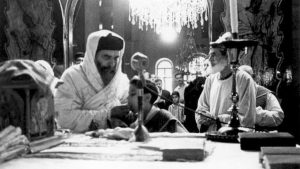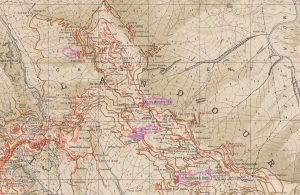In the Western world of the twenty-first century, study after study demonstrates that it is difficult to distinguish the behaviour of a Christian from the behaviour of one who is not a Christian. It is not easy to find the ‘lines in the sand’. Idolatry rarely enters the conversation. Christianity declines, as Empire is supported.
In the Roman world of the first century, the situation was different. Christian communities were known to pursue distinctive lives with distinction. They stood out as different from society. The ‘lines in the sand’ were more clear. Idolatry dominated the conversation. Christianity spread, as Empire was subverted.
In Destroyer of the Gods, Larry Hurtado explores this ‘early Christian distinctiveness in the Roman world’. He finds that ‘Christianity “took to the streets”, generating a novel social project’ (181) – and in so doing, it became ‘a clear and present danger that had to be opposed’ (184).
Why? The Roman world was full of gods. Idolatry was rampant – and the early Christian communities expected ‘its adherents to drop the worship of any other deity’ (38). Worship was reserved for only One. Is that still the expectation today? We kid ourselves if we think our world is not just as full of gods. They may not be people adorned with statues and temples – but my mind defaults to a bunch of ‘-ism’ words when it comes to idolatry today.
Narcissism, and the way we step into the world seeing everything as a mirror for how it affects me. Technicism, and the way we place such hope in technology to save ourselves and the planet. Nationalism, with its lacings of patriotism, and the way we elevate our nation, or tribe, above all others. Consumerism, and the way this habit to taste and to acquire is the way forward to fulfilment. Pluralism, and the way we honour each person’s truth to be equally valuable – and valid. Economism, and the way we measure every decision in terms of its financial costs, or gains.
It goes on and on. We are awash with idolatry as well, but on becoming a Christian do we ‘drop’ such worship of idols and, as a result, do we become a ‘clear and present danger’ in our society? How important for you is it to be different? Who talks like that today?
The Roman world may have made a space for Judaism with its rejection of idolatry, but because this exclusivity was joined at birth with ethnicity Judaism was no threat. It could be contained. However ‘… early Christians took up a new kind of religious identity that, uniquely, was both exclusive and not related to their ethnicity’ (93, emphasis mine). It was ‘translocal and transethnic’ (67). Boom. I love it. That is one of the main reasons I am a Christian. As a result, it could not be contained. It spread … it threatened … it destroyed.
So, following Hurtado’s chapter titles, he writes about Christianity as ‘A New Kind of Faith’ (37-76), drawing forth a ‘A Different Identity’ (77-104) on the way to offering ‘A New Way to Live’ (143-182). This is the bulk of the book. [A fascinating chapter somewhere in the middle – ‘A “Bookish” Religion’ (105-141) – details the ‘variety, vigor, and volume’ (119) of early Christian writings in a religion that is ‘distinctively text oriented’ (141)]. In exploring a ‘new way to live’, Hurtado wanders into two specific issues from Roman times – infant abandonment and gladiatorial spectacles – as he demonstrates how Christianity influenced society by reshaping the behaviour of ordinary Christians. For those with eyes to see, there is this focus on behaviour in the early Christian writings, especially in the New Testament epistles – but today our eyes too easily wander across to the belonging, and miss this behaving.
The most compelling part of the book is when he engages the ‘husband of one wife’ phrase (166-167) and shows how, against its historical context, Paul is exalting women here. This is followed by a section on “Sexual Ab/use of Children” (167-168) where he demonstrates how Christians took the lead by inventing words that made it possible to give voice to condemnation for the first time. Then in his discussion of the ‘household code’ passages (husbands:wives, parents:children, slaves:masters – in Colossians 3, Ephesians 5, 1 Peter 2-3, Titus 2 and 1 Timothy 2, 3, 6) Hurtado argues that these passages reveal how ‘Christian household life should match or even exceed the ideals affirmed in the larger Greco-Roman culture’ (177). In these passages wives and children and slaves are respected enough to be addressed as ‘moral agents’ (179) which was ‘a distinctively Christian innovation’ (178) which contributed in its own way to the subversion of Empire.
Rodney Stark, the guru of early religious movements, argues that ‘a successful religious movement must retain a certain level of continuity with its cultural setting, and yet it must also “maintain a medium level of tension” (Stark’s phrase) with that setting as well … there has to be a clear difference between being an insider to the group and an outsider. (7, emphasis). With an ear to Jesus in the first century, this is simply salt and light remixed. With an ear to James Davison Hunter in the twenty-first century, this is an echo of his way forward: ‘a faithful (to God) presence within the world’. Or, Hurtado himself: ‘fitting in and being different’ (150).
This travels right to the heart of a cause of ineffective mission in the West today. This tension becomes lost. We’d rather fit in than be different. Too much salt, too little light – as relevance becomes the sole criterion. We need to find the tension again and live into it. ‘It would be misleading to portray the relationship of early Christians and their cultural setting as simply consisting of differences, just as it would be erroneous to downplay differences’ (150, emphasis mine). And for us, it can start by living attractive, distinctive, intriguing and subversive lives right in there where the ism idolatry is happening.
If early Christianity essentially affirmed and reflected beliefs, values, and practices commonly shared in the Roman Empire, why would people have bothered to join? (10).
This week I received a newsletter from one of my favourite people in one of my favourite places. He leads a thriving training organisation in a context where the Christian presence in society looks a lot like it did in the first century. They’ve decided that they must add a course to their curriculum on ‘a Christian response to persecution’. WOW – when that becomes a necessity for Christian training organisations in the Western world, might that provide a sign that progress in mission is being made?
nice chatting
Paul
About Me

the art of unpacking
After a childhood in India, a theological training in the USA and a pastoral ministry in Southland (New Zealand), I spent twenty years in theological education in New Zealand — first at Laidlaw College and then at Carey Baptist College, where I served as principal. In 2009 I began working with Langham Partnership and since 2013 I have been the Programme Director (Langham Preaching). Through it all I've cherished the experience of the 'gracious hand of God upon me' and I've relished the opportunity to 'unpack', or exegete, all that I encounter in my walk through life with Jesus.
Recent Posts
Football helps me train preachers. See, when you speak to me about football—or, ‘footie’—I need to know where your feet are before I can understand what you mean. Are your feet in Ireland, or Brazil, or the USA, or NZ—or in crazy Australia? It must be the most fanatical sporting nation in the world. Within…
Having been born in 1959, I don’t remember much about the 1960s. But I have heard a lot. Hippies. Drugs. Rock ‘n Roll. Assassinations. Moon-walking. A quick trip across to ChatGPT informs me immediately that it was ‘a transformative decade across the world’—marked by the civil rights and feminist movements, Cold War tensions, consumerism and…








